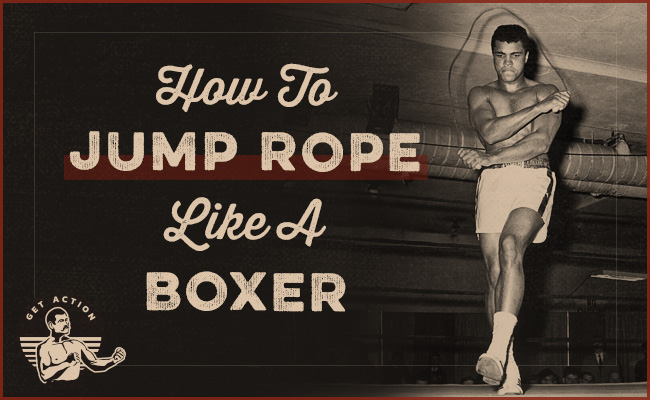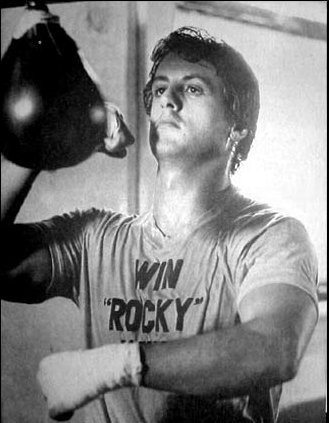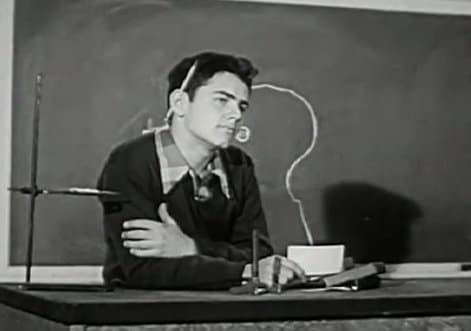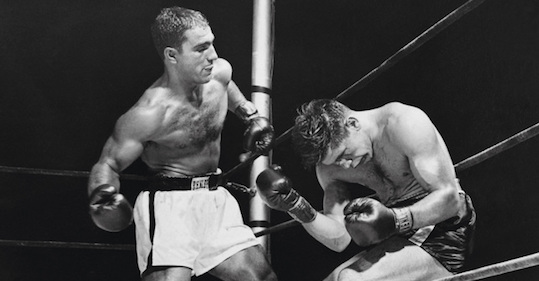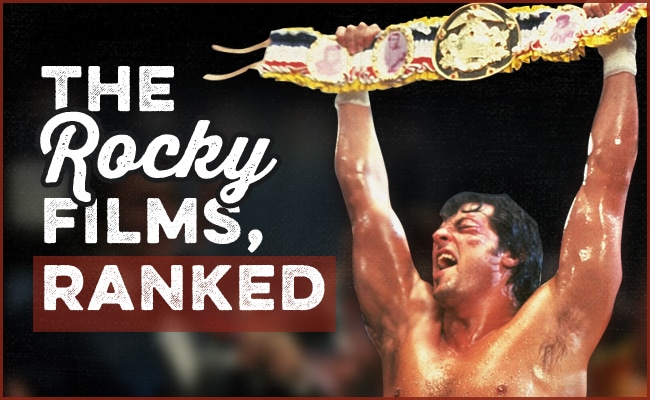
Every night, our family reads a book aloud for ten minutes together, and then watches a movie for ten minutes together. It’s a way to cap off the night with some familial hangout and help the kids wind down before bed.
After making our way, one ten-minute installment at a time, through all the movies every Millennial dad should show his kids and then all the films in the Mission Impossible and Hunger Games franchises, we were puzzling over what to watch next.
Out of the blue, our son, Gus, suggested that we watch Rocky. We weren’t sure where he got the idea, and after a slew of modern, fast-moving action flicks, weren’t sure he and his sister would enjoy a film made back in 1976. But we put it on, and to our surprise (it’s unexpectedly slow — see review below), the kids enjoyed it. We all enjoyed it. And so we decided to move on to Rocky II. The kids remained hungry for more. So over the last couple of months, we watched all the remaining films in the series. And thoroughly enjoyed these as well.
If you haven’t watched the Rocky films, you should check them out. You’ll gain a better understanding of the many pop culture references they spawned that have become permanently embedded in the zeitgeist. And they’re just good flicks. Each installment charts the ups and downs of boxer Rocky Balboa’s career as he moves from small-time pugilist to heavyweight title holder to retired champ. Each boasts exciting, realistic fight scenes and motivating training montages. (Did you know we delineated each and every exercise included in each and every Rocky training montage? Some of our best work there, folks.) And each grapples with worthy themes like what it means to be a man and be resilient in the face of fear, doubt, and setbacks. Some might consider it all a little schmaltzy, but in an age saturated with wink-wink cynicism, we found the straightforward sincerity refreshing.
(An aside: while Arnold seems to be the 80s-action hero who gets the most love and admiration in the present age, Sylvester Stallone arguably goes under-appreciated. His is a Wikipedia page worth reading; it’s full of surprising, impressive facts. Just a few of them: Stallone wrote the script for Rocky in three days, turned down a six-figure deal for it — even though he was dead broke — in order to play the lead himself, and not only wrote the screenplays for all the films in the franchise, but directed nearly all of them too.)
Below you’ll find our rankings as to how each film in the Rocky franchise stacks up. (The list focuses only on the movies where Rocky is the main protagonist and excludes the Creed spinoffs.) While some are better, and some are worse, they’re all worth watching, in chronological order.
#6: Rocky V
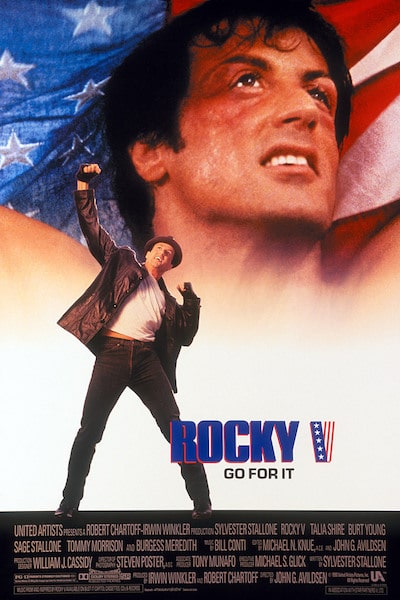
Rocky V, which was originally intended to be the last film in the franchise, was the most critically panned of the Rocky films. But don’t let its low Rotten Tomatoes score or its last place finish on our list dissuade you from watching it. It may be the weakest film in the franchise, but it’s not a terrible movie. In fact, its plot (some conspicuous holes aside) is more cohesive than the film that ultimately became the final Rocky movie (Rocky Balboa), and it deals with an issue seldom featured in cinema: how do you transition when you’re past your peak and can no longer do the thing you’re good at and love?
Because of financial mismanagement, Rocky V finds our fighter right back in the down-and-out circumstances in which he started, and he’s decided to retire from boxing because of worries about the damage it’s doing to his brain. But he can’t give up on the thrill of winning, and so starts living vicariously through a boxer he decides to manage: Tommy Gunn (played by real-life fighter Tommy Morrison). Rocky gets so wrapped up in training Gunn that he neglects his own son, who was played by Stallone’s actual son. The father-son pair have a genuine rapport that adds to the film. Another nice touch is that some of the inspirational speeches in the movie, which includes parallels to Mike Tyson’s story, are drawn from the wisdom of real-life training legend Cus D’Amato.
Yet despite a few strengths, the movie is marred by moments of excess cheesiness and the loss of Rocky fighting and training himself. No matter how decent the plot, no movie in which Rocky coaches rather than contends and that ends with a street brawl in an alley rather than a bout in a ring, is going to rise to the level of the other films.
One indicator of the quality of a Rocky film is whether or not the “Gonna Fly Now” theme gets played in full; there are only two movies in the franchise where it isn’t. This one, and the next entry on our list:
#5: Rocky IV
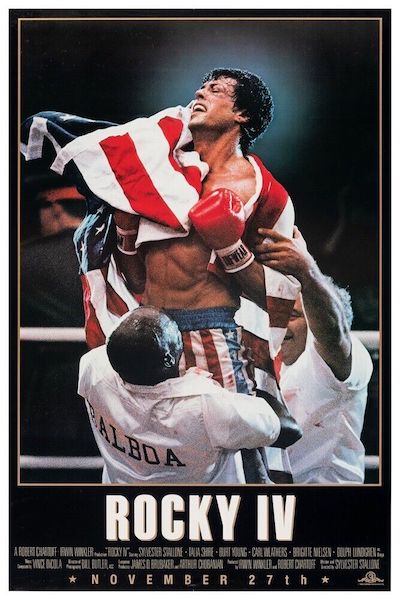
On paper, the epic set-up for Rocky IV would seemingly make it a shoe-in for one of the best in the bunch: Rocky faces off with a Soviet boxer who not only represents the “Evil Empire” but also killed his friend Apollo in the ring. It’s East vs. West! Individualism vs. totalitarianism! Technology vs. old-school heart!
Yet, for all this promise, the picture never pans out. The plot is handled a little too ham-fistedly. More damningly, part of the criteria for evaluating the quality of each Rocky installment is how satisfying the climax of each film’s final fight is, and this one doesn’t deliver. Despite the big stakes, the suspense of the bout never feels palpable, nor does the payoff of Rocky’s victory.
Which isn’t to say this isn’t a watchable and entertaining movie. The training montage (so epic it’s broken into two parts!) is awesome, Ivan Drago is the franchise’s best villain (“If he dies, he dies”), and if nothing else, the movie’s random robot, flashback montage as Rocky drives his Lambo, and “Burning Heart” theme song make for a quintessential showcase of 1980s vibes.
#4: Rocky III
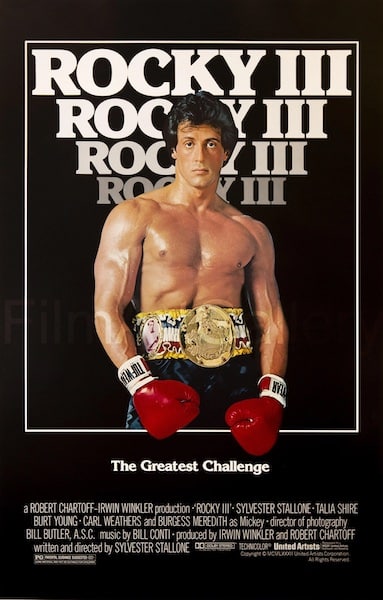
The Rocky films work best when Rocky is a relatable everyman, the underdog. It’s therefore no surprise that the third installment in the franchise, which finds our fighter reigning as the heavyweight champion, living in a giant mansion, and driving a Maserati, doesn’t come up to the quality of the first two films. It doesn’t end up as bad as you think it might from the early over-the-top charity match between Rocky and Thunderlips the wrestler (played by Hulk Hogan). But the plot that follows remains fairly thin: Rocky, who realizes his trainer handicapped his title defenses to ensure victory, decides to postpone his retirement to (twice) fight a fierce, trash-talking contender, James “Clubber” Lang (played by Mr. T).
Yet it’s hard to dislike a film that debuted that hype-up classic, “Eye of the Tiger,” includes an awesome bromance between Rocky and Apollo (his former adversary puts aside his antagonism to become Rocky’s trainer), and introduced both Mr. T and his signature catchphrase (which Stallone wrote) — “I pity the fool!” Plus, though the plot-driven stakes aren’t as significant, the climax of the final bout proves to be the second most satisfying in the series.
#3: Rocky Balboa
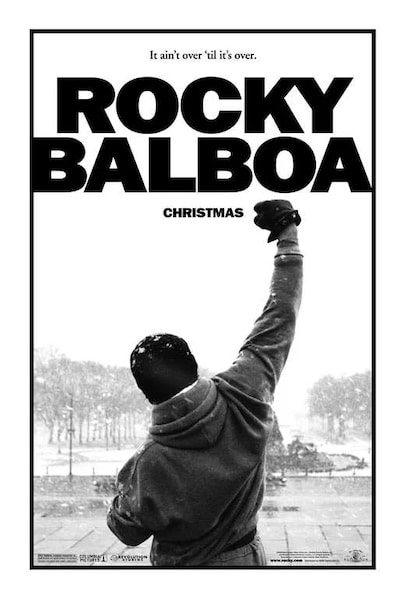 Because many viewed Rocky V as a disappointing conclusion to the franchise, Stallone wanted to make Rocky Balboa as a more fitting capstone. And in this, it succeeds. The film doesn’t have the atmospheric prism that somehow makes films made in the 70s and 80s just seem cooler. But its storyline (Rocky, at age 60, comes out of retirement for one last fight), flashbacks (both to scenes and musical scores used in earlier installments), and overall heart tie up the narrative arc of the franchise nicely. The movie also scores points for the fact that Rocky seems more like the character he was in the first two films. In the sequels, he seems like a different person, more sophisticated than the lovable lunkhead depicted in Rocky and Rocky II. (Obviously, fame and fortune will change a man, but the difference between the character in I and II compared to III and IV seemed too great).
Because many viewed Rocky V as a disappointing conclusion to the franchise, Stallone wanted to make Rocky Balboa as a more fitting capstone. And in this, it succeeds. The film doesn’t have the atmospheric prism that somehow makes films made in the 70s and 80s just seem cooler. But its storyline (Rocky, at age 60, comes out of retirement for one last fight), flashbacks (both to scenes and musical scores used in earlier installments), and overall heart tie up the narrative arc of the franchise nicely. The movie also scores points for the fact that Rocky seems more like the character he was in the first two films. In the sequels, he seems like a different person, more sophisticated than the lovable lunkhead depicted in Rocky and Rocky II. (Obviously, fame and fortune will change a man, but the difference between the character in I and II compared to III and IV seemed too great).
There are some weaknesses: the plot never quite gels — Rocky’s relationship with Marie doesn’t really go anywhere, and the sudden enmeshment of Marie’s son in Rocky’s life and the friction-turned-reconciliation between Rocky and his own son seem too abrupt; everything seems to happen a little too abruptly, really. The movie also goes a tad heavy on the inspirational speechmaking, though these monologues do contain some sage advice: “It ain’t about how hard you hit — it’s about how hard you can get hit and keep moving forward!”
#2: Rocky
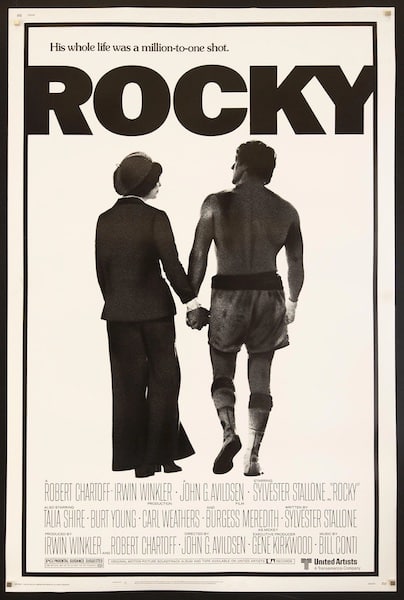
The surprising thing about the low-budget film that kicked off the whole Rocky franchise is how little boxing (whether in the form of training or fighting) the movie includes and how relatively quirky it is. The film has more of an art-house feel than an action-movie vibe. While the backbone of the plot ostensibly revolves around Rocky, a small-time fighter, getting the chance to battle the world heavyweight champion, Apollo Creed, a lot of the movie simply consists of Rocky and Adrian falling for each other and talking about turtles.
But Rocky — which won the Academy Award for Best Picture — has plenty of hard-to-put-your-finger-on charm. Stallone gives a winning, Brando-esque performance, there’s great cinematography of a gritty Philadelphia, and the viewer is introduced to the franchise’s soon-to-be iconic “Gonna Fly Now” theme song and training montage feature, which includes Rocky running up the steps of the Philadelphia Museum of Art for the first time.
#1: Rocky II
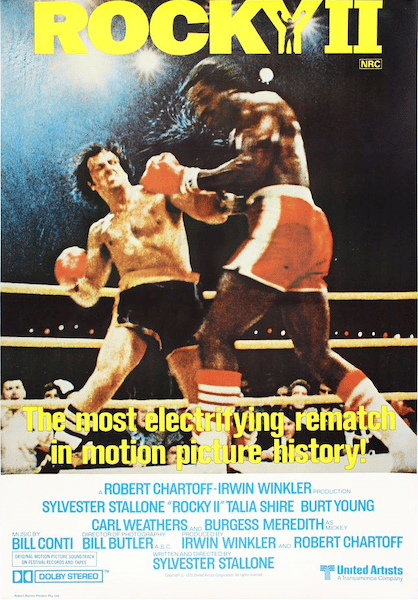
While the original Rocky may get the most acclaim, Rocky II was the unanimous favorite amongst the McKays.
One of the things that makes Rocky II great is that the character of Mickey, Rocky’s crusty, manic old-school trainer (“You’re gonna eat lightning and you’re gonna crap thunder!”) really comes to the fore in the film. Burgess Meredith’s memorable performance leaves you marveling that he’s the same actor who portrayed the cerebral characters in two of The Twilight Zone’s most iconic episodes: Time Enough at Last and The Obsolete Man.
The film also includes Rocky’s feel-good return trip up the museum steps, this time with an entourage of cheering kids in tow. And he chases a chicken as part of his training montage in this one, which is awesome.
Finally, the climax of Rocky’s rematch with Creed — crowned by the iconic line, “Yo, Adrian, I did it!” — is the best of the franchise; it elicited spontaneous fist pumps all around.
Now, on to watch the Creed franchise next . . .


